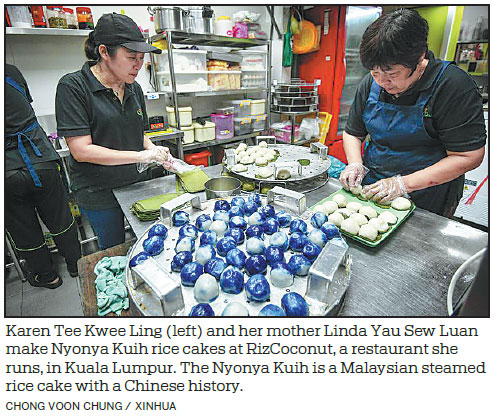Malaysian chef offers up a bite of Baba Nyonya culture
KUALA LUMPUR - One weekend in the kitchen of her restaurant during the early hours of the morning, Karen Tee Kwee Ling is busy preparing cakes for her hordes of breakfast customers.
Tee, along with her mother Linda Yau Sew Luan and several other workers, turn out hundreds of traditional cakes and desserts, collectively known as kuih to Malaysians, but the infusion of unique ingredients from her "Baba Nyonya" background makes her handmade confections stand out from the rest.
The Baba Nyonya are the descendants of Chinese immigrants who came to the Malay Peninsula centuries ago and have developed a unique culture, blending Chinese and Malay elements.
"The taste is different, the ingredients are different - these are not typical cakes. We have a particular flavor that we prefer, lots of screw pine goes into the process," she explains.
The popularity of Tee's cakes and deserts lies in the recipes that were passed down through her family. Her grandmother started making kuih for local coffee shops in Tampin, a small town 120 kilometers from the capital of Kuala Lumpur, in the late 1940s.
Tee's mother Yau learned all the secrets in the family kitchen, before opening her own restaurant in Tampin.
It was Tee who brought the family flavor to Kuala Lumpur. Tee has been making various kinds of kuih since her childhood, having learned the recipes from her grandmother and mother, a fact demonstrated by her ability to prepare 50 cakes in just 10 minutes.
Tee focuses on three types of kuih. The first one is the angku, or red tortoise cake, a small oval-shaped Chinese pastry with soft sticky glutinous rice flour skin, wrapped around a sweet filling. It is molded to resemble a tortoise shell and presented resting on a square piece of banana leaf, typically marked with the Chinese character for longevity.
Her other specialty is koci, a type of dumpling found in Malay cuisine, which has a skin made from glutinous rice flour and is stuffed with coconut and palm sugar.
"We make the traditional koci, not just the usual type with black glutinous rice, but also the original blue version with coconut and sesame filling. Not many people make it now as you have to dye the skin using blue pea (ternatea) petals.
The ingredient is expensive to buy, so she grows her own, along with curry leaves and other ingredients from her hometown in Tampin.
The last is chai kuih, a savory dumpling with plain white skin that has a filling of dried prawns.
All three types of dumplings are cooked for between 10 and 15 minutes in a steamer capable of handling 400 pieces at a time, before being placed on banana leaves, or wrapped in them as in the case of koci.
Tee's restaurant specializes in Baba Nyonya style cooking, using aromatic screw pine leaves as well as lemon grass, lime leaves and curry leaves - lending the dishes a sharp and tangy flavor not usually found in Malaysian fare.
Tee was proud of the special Baba Nyonya flavor she inherited from her family, but for her, it was not only the recipe that was passed down from one generation to the next, but also the techniques for making the cakes.
"My grandmother and mother taught me to prepare my food with honesty and patience, to use the purest ingredients to hand, and to ensure what I make will satisfy my customers," she says as she works on shaping and filling the cakes.
Xinhua

(China Daily Global 09/06/2019 page15)


















